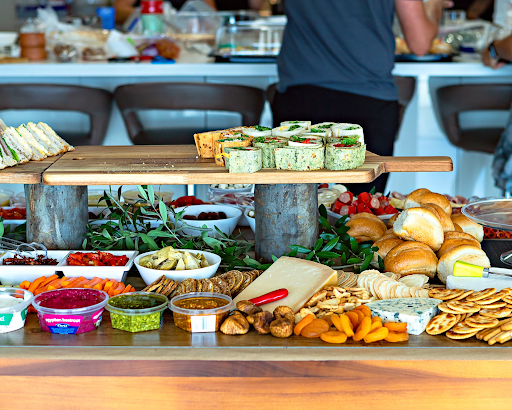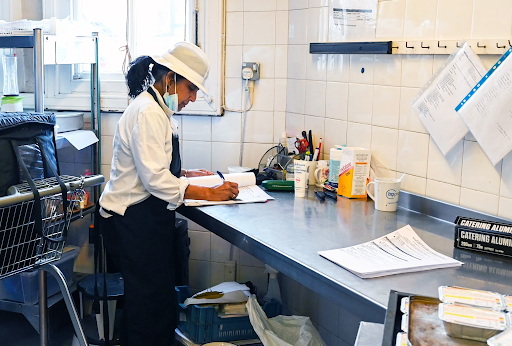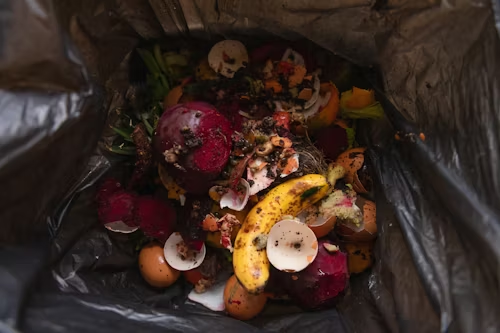Camden Challenge Prize 2025
The Camden Challenge Prize is a recurring innovation competition that tackles a different Camden mission each time. There’s a financial prize for whoever can most effectively solve a problem and demonstrate impact.
The Camden Challenge Prize 2025 has now closed. Find out who the 4 finalists are.
The Camden Challenge Prize 2025
This year, the first ever Camden Challenge Prize aims to spark new ideas and bring fresh perspectives to our Food Mission. Join the movement to create a more sustainable Hospitality and Food Service (HaFS) Sector.
Food waste is a growing issue within the HaFS Sector, but we believe that through innovation and creativity, we can transform how food waste is prevented and managed. We invite everyone – individuals, startups, chefs, innovators, and organisations – to propose new business ideas and innovations to help reduce and manage food waste across the HaFS Sector.
This is your chance to make a difference.
The Prize pot
The winner and one runner-up will be awarded funds to continue developing their ideas, implement and scale their work.
£75,000
The winner of the Camden Challenge Prize 2025 will be awarded £75,000.
£25,000
The runner-up of the Camden Challenge Prize 2025 will be awarded £25,000.
Why this matters
Every year, 285,600 tonnes of food is wasted by the Hospitality and Food Service (HaFS) Sector in London.
With more than 4,200 registered food businesses in Camden, there’s a critical opportunity to reduce food surplus, preserve edible food and properly recycle unavoidable waste. Innovative solutions could unlock environmental, economic, and social benefits for the borough.
Why you should apply for the Challenge Prize
- Funding
Receive a one-off investment to bring your idea to life or accelerate the growth of an existing solution. Whether you’re at the concept stage or ready to scale, the financial support is designed to help you move from ambition to action. - Mentorship and strategic collaboration
Gain access to a network of experts, innovators and industry leaders who’ll work with you to sharpen your strategy, overcome barriers and unlock new opportunities. Our mentorship program offers hands-on guidance and meaningful connections. - Industry exposure and influence
Present your solution to influential people in the Hospitality and Food Service (HaFS) Sector. You could benefit from media coverage, spotlight opportunities and the chance to raise your profile within the growing sector. - Create meaningful, measurable impact
Your innovation could reduce waste, cut carbon emissions, improve supply chains or inspire lasting change—making a real difference to communities and for the planet.
Challenges
Applications should respond to at least one of the Challenges. As Camden already has some outstanding work happening in food redistribution, we are not looking for innovations in that area.
1. Reducing food surplus
The challenge: Enable hospitality and food service businesses to reduce surplus by getting a grasp on how much surplus and waste is created, addressing overproduction or helping them respond more effectively to consumer trends.
Each year in the UK, 18% of food purchased by the Hospitality and Food Service (HaFS) Sector is thrown away – this is 1 million tonnes of food waste at a cost of £3.2 billion. Of this waste, 75% could have been eaten. This means that in the UK alone, approximately 375 million meals a year could have been saved from this sector.
The first step in minimising food waste from the HaFS Sector starts with reducing the amount of food surplus created. Food businesses often don’t know how much surplus they create and they can find it hard to predict customer demand, which leads to overordering and preparing too much food. Factors like the drive for operational efficiency, unpredictable customer footfall and changing dietary trends can often leave businesses with excess food they can’t use or sell. Businesses can opt into redistribution services, and many do, but it’s imperative that they reduce the surplus created.


2. Influencing workplace cultures and practices
The challenge: Shift hospitality and food service workplace culture and practices so that reducing food surplus and waste becomes a natural part of daily routines and decision-making.
There are many different reasons for food waste in the HaFS Sector – 34% of the waste is from consumer plates, 21% from spoilage and 45% from food preparation. Our research has found that the workplace culture in businesses within this sector is a significant contributor to food spoilage and preparation.
In busy food businesses where margins are tight, reducing the creation of food waste is often a low priority. In busy food businesses where margins are tight, reducing the creation of food waste can be a low priority. If a business believes that reducing food waste won’t lead to real savings, and they do not have a clear understanding of the scale and impact of food waste, it can be hard to motivate them to take action. Staff, especially new employees, tend to adopt existing habits in workplaces where waste isn’t taken seriously and everyday practices – like how stock is ordered and managed – often go unquestioned, leading to food being unnecessarily spoiled.
3. Managing inedible food waste
The challenge: Reduce the amount of inedible food waste from hospitality and food service businesses that ends up at landfill, either by supporting businesses to effectively manage food waste that can no longer be eaten or by providing alternative opportunities for utilising that food waste.
Only 17% of London’s food waste and food loss is processed into renewable energy (by the process of anaerobic digestion). If all of it were, it would save enough carbon to power all the homes in Camden for nearly 3 years.
For businesses, food waste collection is 33% cheaper than general waste services, yet only 34% of food businesses make use of them. Barriers like lack of space, time and effort make separating waste out feel difficult and unrewarding. However since April 2025, businesses with more than 10 employees are now required by law to segregate their food waste from their other waste. Any food waste that ends up at landfill is a lost opportunity to create value through renewable energy, composting or upcycled products.

Eligibility criteria
The Camden Challenge Prize 2025 is open to individuals, groups, start–ups and organisations across the UK. They can be students, professionals, startups, non–profits or for-profits, based anywhere in the UK. Whether you’re a seasoned professional or an emerging innovator, your ideas matter.
How to apply
Applications for the Camden Challenge Prize 2025 have now closed. Find out who the 4 finalists are.
Judging criteria
We’re looking for solutions that can make a real, measurable difference in reducing and managing food waste. Applications will be judged based on:
- innovation
- desirability
- feasibility
- viability
As well as representatives of the Food Mission team, the judging panel includes experts in:
- the subject matter
- design and innovation
- venture building
- technology
- environmental services
Partnerships
We’re looking for meaningful partnerships to support the Camden Challenge Prize 2025. We’re open to new ideas for engagement and involvement, so if you have a suggestion then let us know. Here are some ways you could get involved:
- Testbed partnership
Shortlisted applicants will develop early-stage ideas. You can help by connecting them with relevant experts, offering space for early, low-tech experiments, assisting with user testing and providing feedback - Knowledge partnership
Share your expertise with shortlisted applicants, offering guidance and insights that will drive innovation forward - Judging panel
Help us judge the shortlisted applicants to ensure ideas are not only innovative, but also viable and impactful
Contact us
If you have any questions, contact us by email on camdenchallengeprize@camden.gov.uk. You can also sign-up for updates.
If any of the terms used here are unfamiliar to you, our glossary might help to explain. You can also view all of this information in a PDF format.
View the full terms and conditions of the Camden Challenge Prize 2025.
